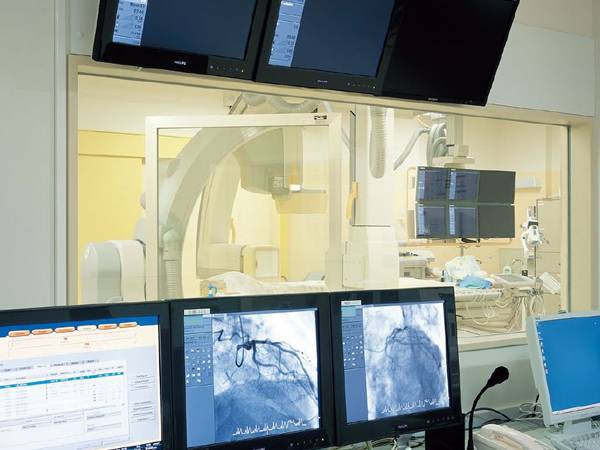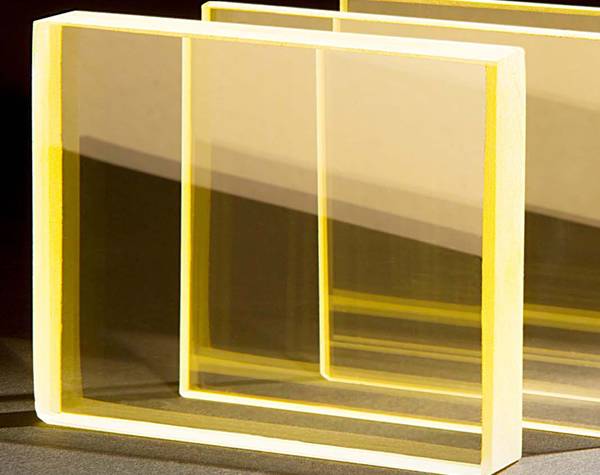
Radiation shielding glass for angiography room
Radiation Shielding Glass, also known as X-ray glass or lead glass, is leaded glass that provides shielding protection by absorbing the energy of radiation. Its high lead and barium content, and wide thickness range, provide optimum shielding against radiation. The glass can be optically clear or have a slight yellow. Typically, the thicker the glass, the higher the level of radiation shielding. It is primarily used in the medical industry to provide protection against gamma rays and x-rays.

Radiation shielding glass provides optimum shielding against gamma rays and x-rays.
| Thickness | Minimum Lead Equivalence (mm) for Stated X-Ray Tube Voltage | Max. Plate Mass | ||||||||
|---|---|---|---|---|---|---|---|---|---|---|
| mm | inches | 80 kV | 100 kV | 110 kV | 150 kV | 200 kV | 250 kV | 300 kV | kg/m2 | lbs/ft3 |
| 12.0–14.0 | 0.472–0.551 | 4.0 | 3.8 | 4.0 | 3.5 | 3.0 | 3.1 | 3.2 | 67.2 | 13.8 |
| 14.0–16.0 | 0.551–0.630 | 4.7 | 4.5 | 4.6 | 4.1 | 3.5 | 3.6 | 3.7 | 76.8 | 15.7 |
| 16.0–18.0 | 0.630–0.709 | 5.3 | 5.1 | 5.3 | 4.7 | 4.0 | 4.1 | 4.3 | 86.4 | 17.7 |
| 18.0–20.0 | 0.709–0.787 | 6.0 | 5.7 | 5.9 | 5.2 | 4.4 | 4.6 | 4.8 | 96.0 | 19.7 |
Technical Notes:
|
||||||||||
| Physical Properties | Mechanical Properties | ||
|---|---|---|---|
| Optical Properties | Density (g/cm3) | 4.8 | |
| Refractive Index nd | 1.76 | Knoop Hardness (kg/mm2) | 409 |
| Transmission % @ 55 nm through 5 mm path | ≥ 85.0 | Young's Modulus (GPa) | 62.6 |
| Chemical Properties | Torsion Modulus (GPa) | 24.8 | |
| Lead (Pb) | 52% | Poisson's Ratio | 0.26 |
| Barium (Ba) | 17% | Coefficient of Thermal Expansion (×10-7/°C) | 78.8 |
| Item | Length × Width (mm) | Thickness (mm) | |||
|---|---|---|---|---|---|
| RSG-1 | 600 × 400 | 12 | 15 | – | – |
| RSG-2 | 800 × 600 | 12 | 15 | 18 | 20 |
| RSG-3 | 900 × 600 | 12 | 15 | 18 | 20 |
| RSG-4 | 1000 × 800 | 12 | 15 | 18 | 20 |
| RSG-5 | 1200 × 800 | 12 | 15 | 18 | 20 |
| RSG-6 | 1500 × 900 | 12 | 15 | 18 | 20 |
| RSG-7 | 1500 × 1000 | – | 15 | – | 20 |
| RSG-8 | 1600 × 900 | 12 | 15 | 18 | 20 |
| RSG-9 | 1600 × 1000 | 12 | 15 | 18 | 20 |
| RSG-10 | 1800 × 1000 | 12 | 15 | 18 | 20 |
| RSG-11 | 2000 × 1000 | – | 15 | 18 | – |
| RSG-12 | 2000 × 1200 | – | 15 | – | 20 |
| RSG-13 | 2200 × 1200 | – | 15 | 18–20 | |
| RSG-14 | 2400 × 1200 | – | 15 | 18–20 | |
| RSG-15 | 2600 × 1200 | – | – | 18–20 | |
| RSG-16 | 2800 × 1200 | – | – | 18–20 | |
| RSG-17 | 3000 × 1000 | – | – | 18–20 | |
| RSG-18 | 3000 × 1200 | – | – | 18–20 | |
Radiation shielding glass is commonly used to protect professionals and patients in a wide range of healthcare, dentistry, veterinary and industrial environments. Typically, it can be divided into three major categories as shown below:

Radiation shielding glass for angiography room

Radiation shielding glass for CT room

Radiation shielding glass for x-ray room

Radiation shielding glass for medical imaging laboratory
As high lead content glass is more susceptible to staining, the following precautions need to be taken care for installation and cleaning.